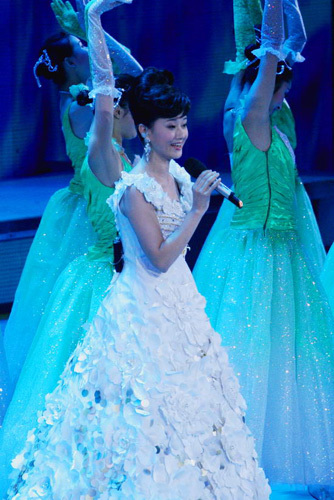New Year for the people
Lao Meng first labeled his show "Shanzhai," which means copycat, one of the past year's catchwords that was first used to refer to IT clones and then became popular when describing DVD parodies of celebrities. Its meaning has now expanded to cover all types of unauthorized products and methods used by amateurs.
|

|
|
CCTV's Spring Festival Gala rehearsal
|
Realizing that this term didn't have such a favorable connotation, Lao Meng downplayed the phrase, emphasizing the grassroot's involvement in his show.
"It will be a popular Lunar New Year celebration based on grassroots wisdom and culture" said Han, who added that the performances will offer an opportunity for migrant workers and college students who do not go home to have a good time in the Spring Festival. "It will have nothing to do with piracy, because all the programs will be original," stressed Meng.
Keeping a low profile
Lao Meng refrained from openly challenging CCTV. He softened the tone of his promotions, saying he wanted to "play together with CCTV", and he repeatedly expressed the wish to learn from the established broadcaster.
At a Dec. 18 press conference, he announced an agreement with South China's Guizhou Satellite TV station to air his show. A week later, Guizhou TV reportedly backed away. According to a report by the Guangzhou-based Southern Weekend, the station had been told not to get involved in Shanzhai programs.
A CCTV program director was quoted by the Beijing-based Morning News as saying: that "we're too busy to pay attention to the Shanzhai show".
Also, sources from the preparatory committee for the show said that they were not aware of reports involving CCTV".
A senior media observer in Beijing, who declined to be identified, said that if the report was true, it indicated that the authorities "are not yet ready to lift the CCTV monopoly in this particular paramount show of the year".
But the remote controls were in the hands of the audiences. "It would be unwise to clamp down on such a popular celebration," he added.
Even if the broadcasting authorities weren't directly intervening, fear of them might keep performers, companies from openly joining or supporting the show financially.
Lao Meng denied rumors that he had sponsorships worth more than 20 million yuan (about US$2.9 million). He explained that he was funding the show with his own money with the help of some donors and added that the performers would not be paid for their work.
Some of the media spotlight has shifted from the usual speculation over the CCTV show to the grassroots challenger, especially in the online world.
According to Lao Meng, at least two internet companies had agreed to a live online broadcast of the Shanzhai New Year's Eve show.
However, online broadcasting isn't an ideal alternative, because overloaded servers can crash, and many migrant workers don't have computers or internet access in their rural homes.
"We're continuing the effort to get it on TV," Lao Meng said.
A latest report by Jinghua Times said the Macau-based MASTV was to air live the Shanzhai show.